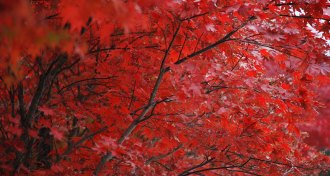Uncategorized
-

19146
Concerning the Apollo rocket’s third stage returning to Earth orbit: How did the researchers determine the source to be Apollo 12, since there were six other Apollo moon missions? Did they use some fancy orbital mechanics along with statistical probability? George RichesonBrenham, Texas Yes, they did, and the orbit matched. Also, the researchers found no […]
By Science News -
 Astronomy
AstronomyNews flash: Earth still has only one moon
An object discovered orbiting Earth in early September isn't a moon but something much more mundane—an upper stage of a rocket that was used in the Apollo 12 mission to the moon.
By Ron Cowen -

19185
In response to this article, I’d like to ask why is it that on our campus, native swamp maples growing within 30 feet of one another display totally different leaf color? While I appreciate them aesthetically, I’d also like to understand why their anthocyanin production is different. Marcia WalshNorth Andover, Mass. According to David Lee […]
By Science News -
 Plants
PlantsWhy Turn Red?
Why leaves turn red is a stranger question than why they turn yellow.
By Susan Milius -

19145
Your recent article on the exact nature of bubbles in beer and other beverages keyed an old memory. In Cleveland, during Christmas, one brewery used to bring out its holiday oddity for sale. They billed it as “the pale stale ale with the foam on the bottom . . . and the top!” There really […]
By Science News -
 Physics
PhysicsThe Physics of Fizz
Toasting a burst of discovery about bubbles in champagne and beer.
By Peter Weiss -

Ah, my pretty, you’re…#&! a beetle pile!
Hundreds of tiny, young blister beetles cluster into lumps resembling female bees and hitchhike on the male bees that they seduce.
By Susan Milius -
 Tech
TechCivilians get better GPS
President Clinton directed the Defense Department to stop degrading signals from 24 Global Positioning System satellites, allowing civilians to receive the same location-pinpointing accuracy long available to the U.S. military.
By Janet Raloff -

19184
In this article, I was surprised to read that chimeras harboring a mutation are not medically useful. Consider the value of cytokine-receptor mutations in humans, with respect to HIV. It’s likely that introducing some genetic mutations can inhibit viruses or bacteria in a host. Freda Wasserstein Robbins New Jersey City University Jersey City, N.J.
By Science News -
 Plants
PlantsNew gene-altering strategy tested on corn
Scientists have created herbicide-resistant corn with a new kind of genetic engineering that involves subtly altering one of the plant's own genes rather than adding a new gene.
By John Travis -
 Astronomy
AstronomyX-ray satellite goes the distance
Using the sharp X-ray eye of an orbiting observatory, astronomers have employed a novel method to measure distance within the Milky Way.
By Ron Cowen -

Leggy beetles show how insects lost limbs
Inactivating two genes in red flour beetles causes grubs to grow lots of legs—and provides clues to the puzzle of the evolution of the six-legged body plan.